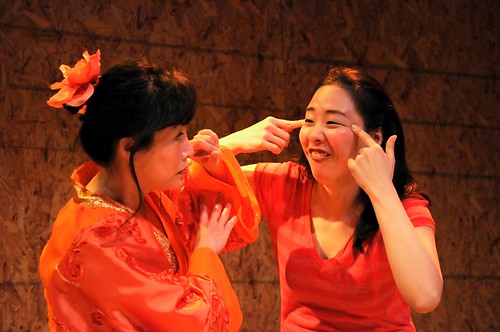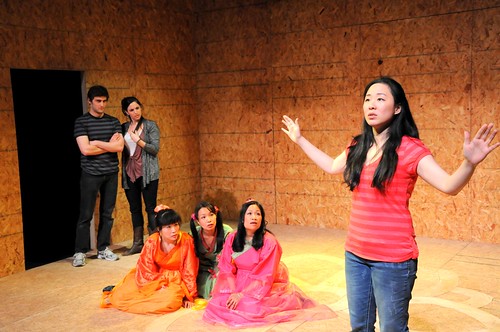Korean American (Cindy Im, right) makes fun of Korean 3 (Katie Chan) in Young Jean Lee’s mind-bending Songs of the Dragons Flying to Heaven, a co-production of Asian American Theater Company and Crowded Fire Theater Company. Below: the cast of Dragons, including (from left) White people (Josh Schell and Alexis Papedo) and the Koreans (Katie Chan, Mimu Tsujimura, Lily Tung Crystal) and Korean American (Cindy Im). Photos by Dave Nowakowski
Race shmace. Let’s do plays about explosions – exploding race, exploding narrative, exploding audience brains.
That’s sort of what Young Jean Lee’s Songs of the Dragons Flying to Heaven is like. This co-production of Asian American Theater Company and Crowded Fire Theater Company is filled with intelligence, talent and 70 minutes of utterly compelling theater. But the whole effect is somewhat like being too near an explosion. Afterward, you ears ring, your head pounds and your equilibrium’s a little off.
But that’s a good thing, right?
Playwright Lee, who dropped out of UC Berkeley’s English PhD program after six years, said something really interesting in an interview with American Theatre magazine last fall. “It’s a destructive impulse – I want to destroy the show: make it so bad that it just eats itself, eating away at its own clichés until it becomes complicated and fraught enough to resemble truth.”
By the end of Dragons, I couldn’t tell you exactly what it was about or even what it was I had just seen. But I would say it was original, outrageous and absolutely honest in its intention to entertain and eviscerate.
From the beginning, I sat there trying to identify metaphors from what I assumed was a satiric piece about Asian-American identity politics. But then I quickly gave up trying to assign formulas and just let it happen. I adopted this strategy in the first 10 minutes of the show, when we’re subjected to scenes of Lee being slapped in the face over and over again. First we hear the audio from the filming session when Lee was being pummeled. We hear a director guiding the slapper and telling Lee to fix her hair. Then we see some of the video results from that session – just the sounds of the slap and Lee’s immediate reaction (never the hand making contact). Essentially we’re watching a woman crying as she’s beaten for – what? – for her art?
It’s an unsettling start, and rather than try to figure out how it made sense, I took the emotion of it and let that be the entrance to the show, which is less a show and more of a collage. It’s like performance art – with extended bits in Korean – but with more self-awareness than usual. During a more conventional scene between a dying Korean grandmother (Lily Tung Crystal) and her Korean-American granddaughter (Cindy Im), the grandmother berates the granddaughter for making such a video.
I’d say that this scene, in which the grandmother breaks the granddaughter down emotionally and then tries to guide her into the arms of Jesus, is Lee making fun of conventional drama, but Im connects so powerfully to the emotions of the deeply unhappy granddaughter, that it’s actually quite effective.
Credit director Marissa Wolf, Crowded Fire’s artistic director, for somehow finding pockets of emotion amid the flying performance shrapnel, which includes an extraordinary pantomime among the Asian women – Im, Crystal, Mimu Tsujimura and Katie Chan – about gory, violent suicides (the one involving the newborn baby and the umbilical cord is extraordinary) that is set to Mariah Carey’s “All I Want for Christmas Is You.” We also get dance routines to Korean pop songs, angry racist monologues (that are actually quite hilarious), amazingly effective “reverse Bible study” and an intriguing recipe involving mud fish.
In between there’s a lot of pretend violence, destruction and craziness (with choreography by Dohee Lee) executed with manic aggression by a superlative cast. Oh, and there are white people.
Yes indeed, one of the major components of Dragons is a heterosexual couple (played by Alexis Papedo and Josh Schell) who are working out some major issues in their relationship. In their first scene, the woman tells the man that he’s “right on the borderline of being smart enough” for her and that his face is “inevitably inadequate.” You’d think this might signal the end of their relationship, but it’s only the beginning.
Somewhat amazingly, the white people take over the play. After a breathtaking quintet delivered by Korean American and Koreans 1, 2 and 3 (their official names) that calls into question everything we’ve seen in the show, the white people turn the rest of the play into their therapy session. A play that was so consciously about race and not about race suddenly becomes about a relationship that has nothing to do with culture or skin color or nationality and everything to do with narcissism, self-worth and the mysterious illness known as love.
Songs of the Dragons Flying to Heaven is one of those theater experiences that wakes you up and makes you feel excited to be watching it minute after surprising minute, then makes you feel like you’ve completely missed it. There’s something important and ridiculous about it in equal measure. It’s a theatrical explosion that stuns as much as it delights and discombobulates.
[bonus video]
Watch the trailer for Songs of the Dragons Flying to Heaven.
FOR MORE INFORMATION
Songs of the Dragons Flying to Heaven continues through April 16 at the Thick House, 1695 18th St., San Francisco. Tickets are $15-$35. Visit www.songs.eventbee.com for information.


